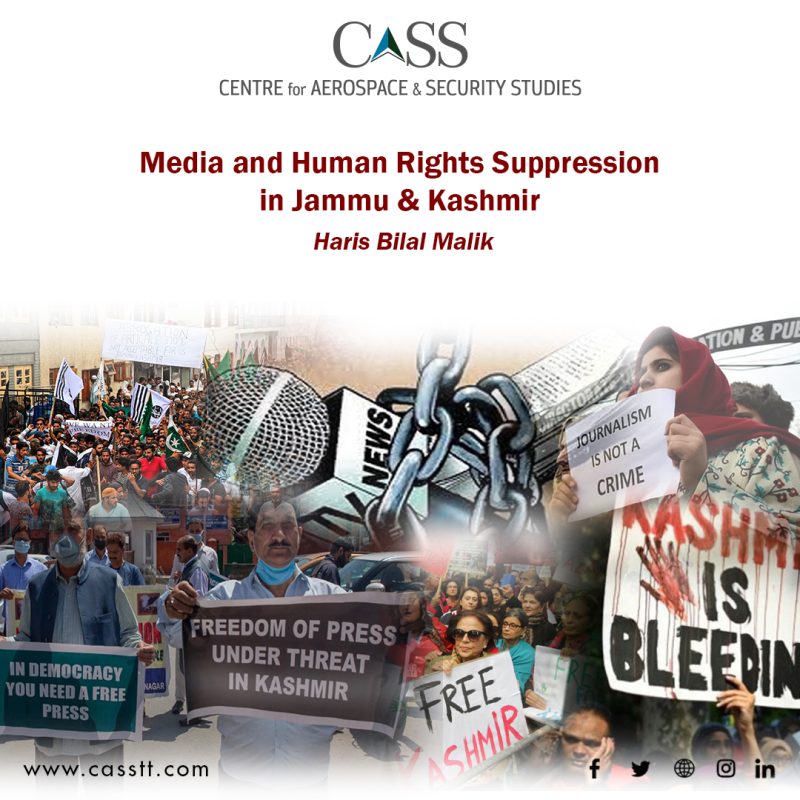In recent years, role of the media as the ‘fourth estate’ has expanded because it has the ability to shape, change, and even reshape the opinions of the masses towards any general or specific issue. In the same vein, media can draw attention towards the negative things that governments and societies as a whole do, for instance, non-existence of rule of law, suppression of people, human rights violations etc. Being an important part of society, the media has considerable influence over the polity and government in any country. However, at the same time, there are countries, where media has been subject to restrictions, blackouts, and they curtail or censor freedom of expression on specific issues, regions, or groups of people. In such countries, governments suppress the media to avoid being exposed for their poor governance. This is especially true of Indian Illegally Occupied Jammu and Kashmir (IIOJK) as this article will discuss, along with the current human rights status of the disputed region.
In IIOJK, it has been more than three years now, since the August 2019 revocation took place. The BJP-led Indian government abrogated Articles 370 and 35(A) of the constitution that previously granted special constitutional status to the Jammu & Kashmir region. Apart from this constitutional aspect, the Indian government has also imposed a curfew and a complete media and communication blackout. Since 2019, as reported by the Human Rights Watch, media, civil society groups, and human rights activists have been subject to a crackdown under the pretext of counterterrorism and public safety laws.
In its recent report, Amnesty International highlighted that repression of the people of IIOJK, particularly journalists has drastically increased. This specifically includes restrictions on the rights of freedom of opinion and expression. The title of the report ‘We are being Punished by the Law’ itself is both symbolic and significant in this regard. For instance, since 2019, 180 journalists have been called and harassed at various police stations during trumped up accusations and charges. Even the ‘Kashmir Press Club’ has been shut down since January this year.
A UK-based investigative firm, ‘Stock White Investigations’ (SWI) has also published a report titled ‘India Silencing Journalism and Human Rights in Kashmir’ which exposes how the Indian government is involved in systematically suppressing the voices of journalists and human rights activists working in IIOJK. The ‘Unlawful Activities (Prevention) Act (UAPA)’, ‘Indian Penal Code and Public Safety Act’, which provide extensive power to the state to declare anyone a terrorist, have been used and various journalists were charged under these acts. SWI also points towards various illegal cases against journalists and how they were prosecuted and denied justice. For instance Kashmiri journalists Sajad Gul, Fahad Shah and Asif Sultan were charged under these laws and were kept detained for long periods despite being granted bail by the courts. The report further reveals that the Indian government has made sure that no media reporting, which is critical of the Indian government’s atrocities, goes to the outside world.
Regarding human rights suppression, the SWI study is based on documentation of 2000 testimonies of Kashmiris during 2020-21.The majority of cases include crimes like extrajudicial killings, forced disappearances, kidnapping, torture, and sexual violence against women. In this regard, it reveals that there have been 450 cases of torture, 1500 cases of pellet gun victims, 100 forced disappearances, and 30 cases of sexual violence against women. Also, the occupying forces have prevented the victims to report these crimes to the local police stations. The report further maintains that India’s higher authorities, including the former army chief, General Manoj Mukund Naravane, and the Home Minister Amit Shah, along with eight other senior military officials, have been responsible for these atrocities and that they need to be held accountable. In this regard, in January 2022, the SWI submitted extensive evidence to the UK Metropolitan Police’s War Crimes Unit, which showed how the top brass within the Indian political and military leadership has been involved in such abuses. Ironically, the legal system in India also protects such atrocities, for instance, various counter-insurgency and counterterrorism legislations provide legal cover to the abuses against Kashmiri people.
These reports by international agencies raise significant questions about India’s claim of being the world’s largest democracy where democratic values like respect for freedom of speech, communication and human rights exist and flourish. Whereas contrary to this rhetoric, India’s recent media policy declares reporting on such incidents of abuse and censorship as a threat to the country’s sovereignty. This contradiction further vindicates that India has been involved in systematic suppression of media freedom and human rights abuse especially over the last three years.
Even though the Government of Pakistan’s response against the August 2019 revocation was impactful and received traction within the international community which led to ‘internationalising’ the Jammu & Kashmir dispute, somehow with the world focused on the war in Ukraine and the leadership caught in internal firefighting, it is once again being put on the back burner. Given the timing of the SWI report, Pakistan should reboot its campaign of exposing India’s suppression of media and human rights abuses in IIOJK. Furthermore, the Foreign Office with the Ministry of Information & Broadcasting, should develop a long-term strategy to lobby the international media to showcase how fellow media personnel/journalists are being treated in the occupied territory. However, apart from the state media, local private channels also need to play their due role and provide more coverage to stories that expose media and human rights suppression in IIOJK.
Haris Bilal Malik is a Researcher at the Centre for Aerospace & Security Studies (CASS), Islamabad, Pakistan.





